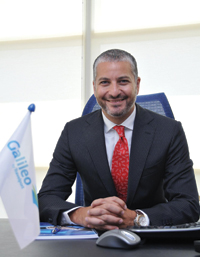
The future direction of the travel industry in the Middle East and Africa was subject to extensive discussions by more than 100 industry experts from 17 countries at a Travelport-organised summit from November 19-20, 2012 in Cape Town.
The latest Travelport e-volve summit focussed – for the first time – on key matters affecting Travel Management Companies (TMCs), with debates ranging from the economic outlook to the future of airline distribution and other relevant topics.
Conceptualised as a ‘travel industry masterclass’, the event set out to find strategic solutions to key industry-related issues and break through frontiers to explore the opportunities of tomorrow.
“The e-volve TMC Summit was a first for Travelport and for the industry,” said Rabih Saab, president and managing director, Middle East and Africa, Travelport. “It’s the first time we have brought together so many experts to explore the future of the travel industry in the Middle East and Africa. Travelport, as a key business services provider to the travel industry, is uniquely placed to understand the challenges faced by both – travel suppliers as well as providers – and it was fantastic to see both sides come together to debate the big issues affecting TMCs and find innovative solutions for the future of travel in our region.”
Over the two days, the Summit explored a number of topical themes and some of the key conclusions to come out of the event included:
 |
• Point of sale technology should empower travel agents to sell more efficiently and give them the choice of how they want to sell their products. Travelport’s next generation point of sale tools such as Travelport Smartpoint and Travelport Universal Desktop are already helping agents achieve this – as was demonstrated through a customer case study, which showed that using Travelport Universal Desktop has seen their business productivity improve by 15 per cent.
• More efficient distribution through GDS channels is a key priority for regional Low Cost Carriers (LCCs). Wider distribution in new markets and building product positioning and awareness were cited as key pillars for effective distribution by Brian Kitchin, Executive Manager, Sales and Distribution, for kulula.com. His view was supported by Travelport, which hosted a dedicated session during the Summit on the future of airline distribution. With a focus on merchandising opportunities through the GDS channel, the session underlined Travelport’s commitment to work with carriers to enable them to distribute all of their products in any way that they choose.
• Intelligent search is all about providing the best-informed choice, fast. A dedicated session looked at how Travelport’s high performance search already delivers industry-leading relevancy, and what the future holds. Travelport is leading the way in semantic search and, in partnership with a third party developer, is currently developing a mobile voice recognition application powered by natural language search and voice-recognition technology. The Summit audience was even wowed with a live preview demonstration.
“This summit was about pushing boundaries in order to really think about the future opportunities in our industry,” commented Saab. “Through this event, Travelport provided industry leaders from the Middle East and Africa with the perfect platform to share experiences and best practises, and be truly innovative in their views and future actions.
New Study
Travelport recently released the findings of an international survey providing insight into how digital leisure travellers plan and book their trips: from the frequency of their holidays to how they go about researching and planning their journey.
The study, which included the UAE, also explored their use of technology and social media and how travel agents can rise to the challenge of their evolving needs throughout their trips. Travelport estimates that the market for global intermediary leisure travel is expected to be worth $672 billion by 2015.
Investigating the varying opinions and preferences of the ‘digital natives,’ (those under 35) and the ‘digital immigrants,’ (those 36-45), key findings from the survey include:
The need to stay connected and a heavy dependence on smartphones: 87 per cent of those aged 35 and under, and 80 per cent of those 36-45, owned or planned to purchase a smartphone in the next six months. This increased access to the internet anytime, anywhere, is changing the expectations, demands and behaviours of leisure travellers.
Higher levels of interest in accessing travel and destination information before a trip: treating the smartphone as a “personal assistant.” 60 per cent of the ‘digital natives’, for example, consider a smartphone to be their ‘personal travel assistant or companion’ enabling interaction to take place at any time. Both groups prefer to access pre-travel information via mobile technology, rather than through traditional devices. This indicates the importance of travel itineraries that can be integrated with other apps, and formats that are easily read on mobile devices.
Despite using their technology-savvy to research and book trips themselves, both groups of leisure travellers reported they are becoming increasingly confused with the amount of information on the web and were more likely to engage with a travel agent for complex trips.
The research also takes a look at how leisure travel agencies are servicing their travellers in terms of contact before and after the trip and the services they sell, and concludes that opportunities to better service their ‘digital native’ and ‘digital immigrant’ customers exist. While travel agents are often actively involved in the run up to a leisure traveller’s journey, only one in two, continue involvement after a traveller boards their flight. Yet the survey revealed growing interest from mobile users in receiving more promotional offers on hotels, dining offers, airport information and recommendations while they were away. In fact, 41 per cent of travellers indicated they wanted to receive more relevant offers.
